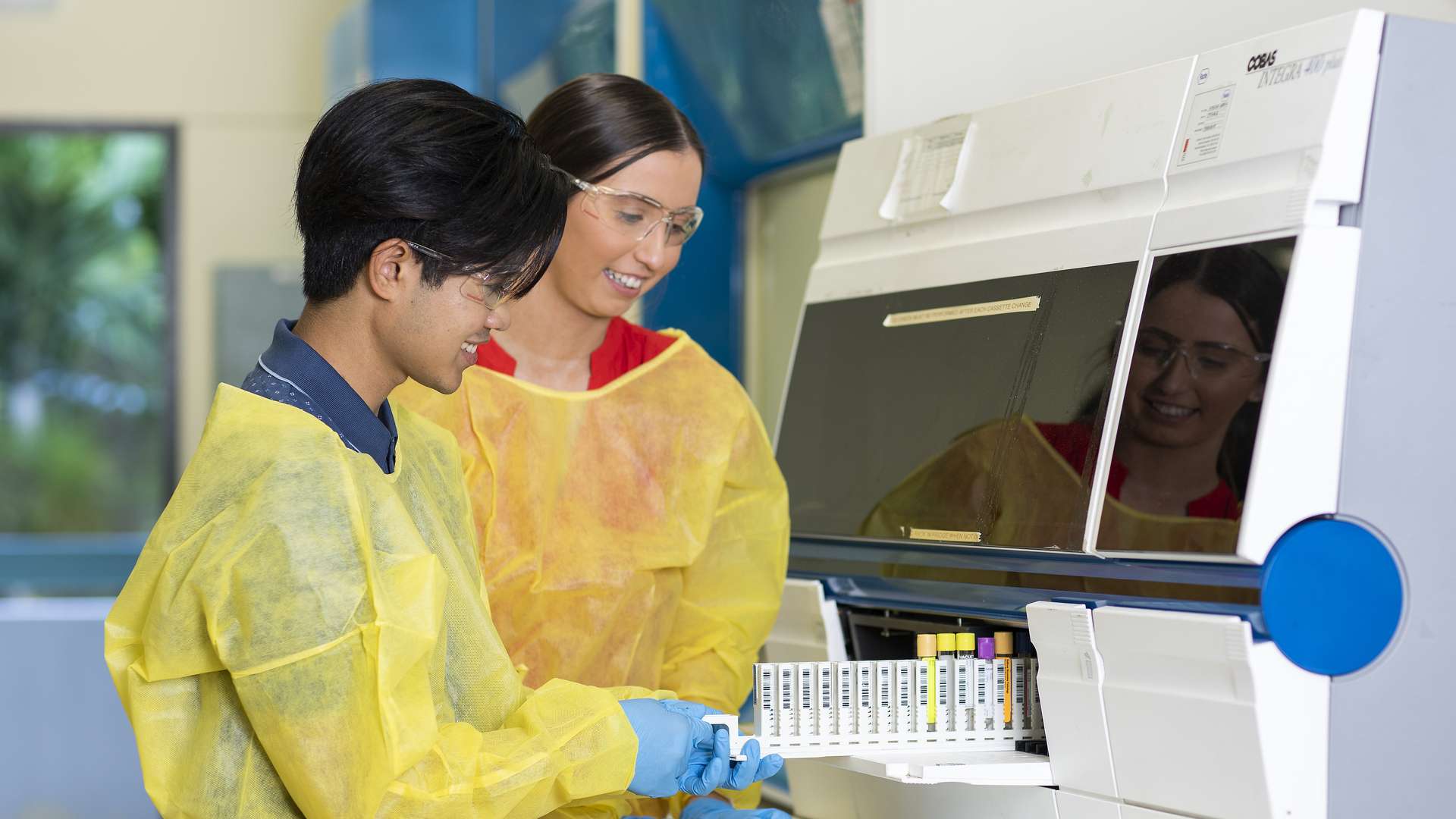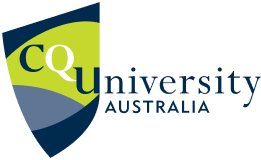| Rank threshold | ATAR: 69 SR: 69 |
| Duration | 3 years full-time, 6 years part-time |
| Location | Online and |
| Next start term | Term 2, 2024 |
| Study mode | On Campus, Online |
| Course code | CG93 |
| First-year fee | $9,888 (Indicative) (CSP) |

Overview
Explore health and disease issues and equip yourself with practical skills by studying the Bachelor of Medical Science. This course will prepare you to undertake best practice in patient testing, developing therapeutics, monitoring disease and sharing knowledge in the medical biotechnology or pharmaceutical industry. Benefit from the flexibility to tailor this degree to suit your career goals with a choice of majors in clinical measurement, nutrition, pathology or biotechnology.
The Bachelor of Medical Science aims to develop your skills to apply Clinical Physiology, Nutrition or Pathology knowledge to clinical practice in a health professional role or Biotechnology in support industries and medical research.
The course is designed to build a high level of technical and evaluative skill so you can assess and implement recommendations for best practices in patient testing, monitoring and education or develop therapeutics in the cutting-edge medical biotechnology or pharmaceutical industry. The course also aims to develop high-level communication skills to interact positively with patients/clients, other health professionals, or industry leaders and be ready for the clinical or scientific work environment.
Clinical decision-making and problem-solving abilities will be promoted through opportunities such as developing designing, conducting and interpreting medical research skills.
Career Opportunities
Graduates of the Bachelor of Medical Science course from CQUniversity have developed the expertise and skills to work as health professionals in pathology, clinical physiology, biotechnology or nutritional areas.
The clinical physiology specialisation will prepare students for employment as clinical measurement scientists. The specialisation offers multidisciplinary training in diagnostic physiological measurement in cardiac sciences, respiratory sciences, neurophysiology and sleep science.
The biotechnology specialisation will prepare students for the medical research or biotechnology industries. With an emphasis on cutting-edge technologies in the development and application of therapeutics, the student is ideally placed to pursue a career in the biopharmaceutical industry or medical research laboratories.
Interested in a career in Pathology or as a Medical Laboratory Scientist? Explore our Bachelor of Medical Laboratory Science (Honours).
Structure & Availability
Course structure
You will study eight core units and a major in either Biotechnology, Clinical Physiology, Nutrition or Pathology.
If you choose to study a major in Biotechnology, Clinical Physiology or Nutrition, you will also select two minors from a prescribed minors list outlined in the Majors and Minors section below.
If you study the Pathology major you will be required to complete 16 pathology units without the inclusion of minors.
You also have the option to study the Biotechnology major and select a Diagnostic Pathology co-major. Upon graduation, if you opt for this co-major, you will receive the award of Bachelor of Medical Science (Biotechnology and Diagnostic Pathology). With this option, you also may transfer into the four-year accredited CL10 Bachelor of Medical Laboratory Science (Honours) degree.
Unit information
For information on the units you could study as part of this course, visit the Handbook and select the "Course Structure" tab.
Credit transfer information
If you have already completed study relevant to the course you have enrolled in, you may be eligible for credit transfer.
On-Campus Availability
| Intake | Locations |
|---|---|
| Term 1, 2023 | Bundaberg, Rockhampton |
| Term 2, 2023 | Bundaberg, Rockhampton |
| Term 1, 2024 | Bundaberg, Rockhampton |
| Term 2, 2024 | Bundaberg, Rockhampton |
| Term 1, 2025 | Bundaberg, Rockhampton |
| Term 2, 2025 | Bundaberg, Rockhampton |
Online Availability
| Intake | Locations |
|---|---|
| Term 1, 2023 | Available Online |
| Term 2, 2023 | Available Online |
| Term 1, 2024 | Available Online |
| Term 2, 2024 | Available Online |
| Term 1, 2025 | Available Online |
| Term 2, 2025 | Available Online |
Choose a major that suits you.
Enjoy a choice of majors that allow you to tailor your studies to suit your career goals or learning interests. Choose from:
Biotechnology
This major will prepare you for the medical research or biotechnology industries. With an emphasis on cutting-edge technologies in the development and application of therapeutics, the student is ideally placed to pursue a career in the biopharmaceutical industry or medical research laboratories. The major consists of 8 units (48 credit points), and with this major, you'll need to choose a second major or two minors from those listed below.
Second major options:
- Diagnostic Pathology Major: completing this major means you'll graduate with a Bachelor of Medical Science (Biotechnology and Diagnostic Pathology). You'll also be eligible to transfer into the 4-year accredited Bachelor of Medical Laboratory Science (Honours).
- Food Technology Major: this major provides the opportunity to combine industry-relevant experience that translates across Human Health, Nutrition, Agriculture and Food Technology industries.
- Pathway to Teaching (Secondary) Major: this major allows for potential eligibility to CQU's Master of Teaching (Secondary) provided the GPA requirements and other admissions criteria are met.
Minors:
- Research Minor
- Chemistry Minor
- Entrepreneurship Minor
- Liberal Studies Minor
Clinical Physiology
Studying this major will prepare you for employment as a clinical physiologist and medical scientist. The major offers multidisciplinary training in diagnostic physiological measurement in cardiac sciences, respiratory sciences, neurophysiology and sleep science. You'll study eight units (48 credit points) and need to choose two minors to complement your studies in clinical physiology. Your choice of minors includes:
Minors:
- Biomedical Minor: this minor is highly recommended if opting to pursue a career pathway to practice as a Clinical Physiologist/Scientist. If you are interested in studying UQ's Graduate Medicine (MD Design) or other Graduate Medicine programs, then this minor should ideally be studied with the Research Minor as an ideal preparatory undergraduate degree.
- Research Minor: the Biomedical and Research Minors taken together, form an ideal recommended undergraduate degree for those students who plan to apply for future Graduate Medical studies.
- Entrepreneurship Minor
- Indigenous Health Minor
- Liberal Studies Minor
Nutrition
Nutrition is an important and diverse field in today's society. Studying nutrition will enable you to work with individuals or communities to promote healthy lifestyle choices and prevent diet-related diseases. Completing the Nutrition specialisation will prepare you for a career in nutrition-related health promotion and food and nutrition industries and provide a pathway for postgraduate study in health education, research and public health. You'll study eight units (48 credit points) in this major and choose either a second major or two minors from those listed below:
Second major options:
- Clinical Nutrition: if you are seeking a pathway into a Masters of Dietetics this is an ideal second major.
- Food Technology: this major provides the opportunity to combine industry-relevant experience which translates across Human Health, Nutrition, Agriculture and Food Technology industries.
- Psychology: the Psychology Major combines the discipline strengths of a robust program of study in Medical Science Nutrition with Psychology.
- Pathway to Teaching (Secondary): this major allows for potential eligibility to CQU's Master of Teaching (Secondary) provided the GPA requirements and other admissions criteria are met.
Minors:
- Research Minor
- Entrepreneurship Minor
- Liberal Studies Minor
Advanced Work Integrated Learning - BMSC13012
All students enrolled in Bachelor of Medical Sciences (Specialisation) are required to undertake this unit. Students are required to undertake a minimum of 360 hours of compulsory work experience throughout the course. Refer to the More Details section within the Handbook for further information.
Work Integrated Learning - BMSC12005
This unit is specific to students enrolled in the Pathology and Clinical Physiology majors. Students are required to undertake a minimum of 360 hours of compulsory work experience throughout the course. Refer to the More Details section within the Handbook for further information.
Requirements
To be eligible
For your application to be considered, you must meet the following entry requirements.
Student and Course Profiles
View the student and course profiles for this course and learn about CQU's Undergraduate Profile for Term 1, 2023 via our Institute Profile.
During your study
While not needed to apply, you'll need to meet the following requirements throughout your studies.
Fees & Scholarships
Indicative First-Year Fee
The Indicative First-Year Fee is the approximate cost of enrolling in this course for one full-time academic year (eight units over two terms) for a Commonwealth Supported Place (CSP). Your actual fees may vary, depending on the units you select to study and your study load. Fees are reviewed each year and are subject to change. Understanding your fees.
Commonwealth Supported Places
This course has Commonwealth Supported Places (CSPs) available, and as a domestic student, you'll be offered a CSP, provided you meet CSP eligibility requirements. CSPs are subsidised by the Australian Government, meaning you are only required to pay the student contribution rather than full tuition fees.
HECS-HELP Loan
You may be eligible for a HECS-HELP government loan if you are offered a CSP. HECS-HELP is an Australian Government loan scheme that assists you in paying your student contributions. Provided you meet the HECS-HELP eligibility criteria, you may use HECS-HELP to defer part or all of your student contribution fees.
Part of your course costs will include Student Services and Amenities Fees (SSAF). SSAF is charged in addition to your student contribution or tuition fees and is used to help enhance your study experience. There may also be other costs as part of your studies, such as textbooks, technology expenses, travel expenses, professional certifications, uniforms, or vaccinations. Explore other study costs.
We believe a quality education can be for everyone – regardless of background, location, or life circumstances. That's why we offer a variety of scholarships and bursaries that can give you a helping hand with a range of expenses and enhance your employability.
How to apply
How to apply
Check what you need to do to apply to study this course.
Your application options
Follow these steps
Extra admission information
Prior to applying, take a look at important application dates and learn about our admission considerations, such as information for domestic students with overseas qualifications, indigenous support, and elite athlete, coach and performer support. You should also check out the adjustment schemes that might be available to you and how to access them. You can also explore our offer information to learn more about what happens after you've submitted an application and how to respond to an offer to study with CQU.
Start your application
When applying through a tertiary admissions centre (TAC) you can use the relevant TAC code below to search for a course or add it to your application preferences.


